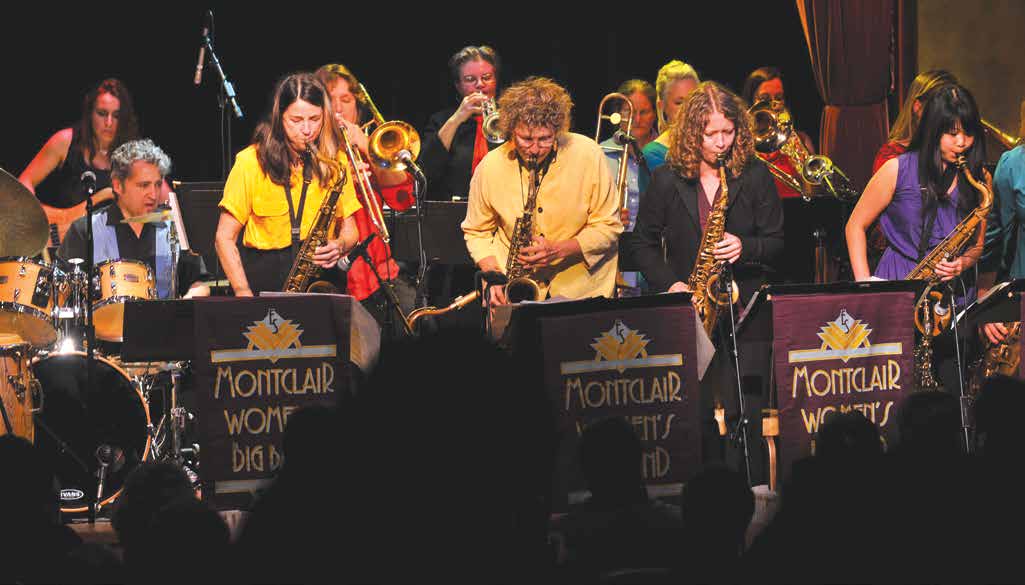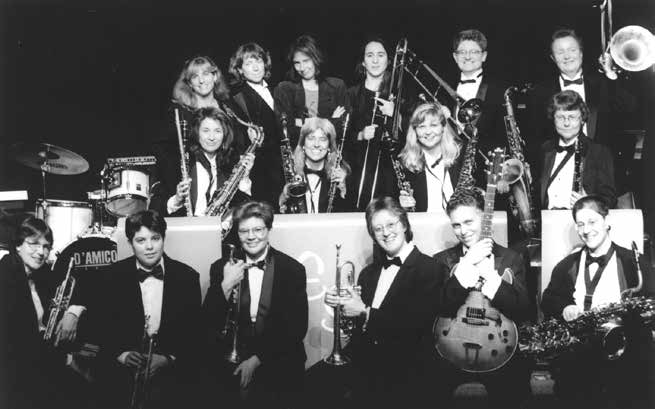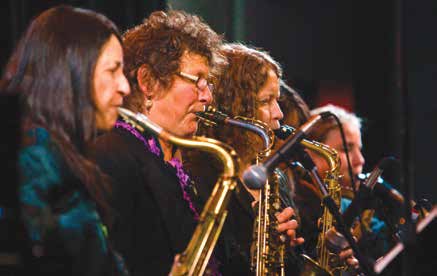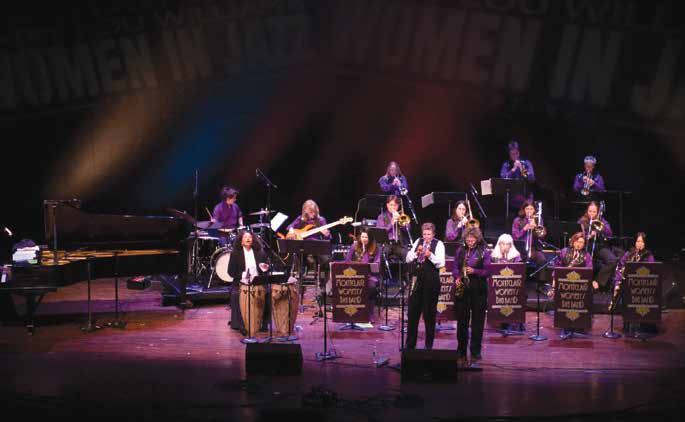
The San Francisco Bay Times and “Betty’s List” are proud to present a new women’s music series at Feinstein’s. The first show kicks off Pride month in grand style with a performance by the Montclair Women’s Big Band on June 2. Founded in 1997 by veteran trumpeter Ellen Seeling and her wife, saxophonist Jean Fineberg, the group is an alliance of some of our region’s most formidable jazz women.
Forging a singular blues-drenched sound with a deep Latin pocket and captivating original material, the Montclair Women’s Big Band impresses audiences with its electrifying powerhouse ensemble. The band’s addictive grooves and inspired solos round out the mix. This extraordinary swing machine will blow you away!
We recently had a great time catching up with Seeling, whose music you probably know, even if her name doesn’t yet ring a bell. Over the years she has performed with Luther Vandross, Laura Nyro, The Temptations, Joe Cocker, Ben E. King, Martha Reeves, Patti LaBelle and many more. Seeling and Fineberg also released many great CDs as the band Deuce, and started the Jazzschool Girls Jazz and Blues Camp, as well as a similar camp for adult women. Seeling additionally teaches music at the University of California, Berkeley, and at the Jazzschool in Berkeley.
San Francisco Bay Times: You are a true groundbreaker, starting from your early years as the first woman to earn a degree in Jazz Studies from Indiana University. How were you introduced to the trumpet, and who were some of your early role models, both personally and professionally?

Ellen Seeling: We always had music around the house when I was a kid in Wisconsin. I sang in the church choir with 3 of my sisters, and we all sang with my mom at home just for fun. When I was about 10, my parents got one of the first stereo phonographs on the market. They also bought a bunch of great records … big bands, musical soundtracks, Fantasia, Scheherazade, Stravinsky, and some Latin music. We listened around the house all the time. I loved the sound and look of the trumpet, and my dad had been a trumpet player in high school. I loved the Basie band, Ellington, Woody Herman, Dizzy Gillespie, all that stuff. So when my little Catholic school decided to start a band when I was in 7th grade, I wanted to play trumpet. My mom took me to the music store and told the sales guy I wanted a trumpet. He told her trumpet would be bad for me as a girl, because it would deform my lips later in life and the boys wouldn’t like that. My mom told him she didn’t care and wanted a trumpet for me right away. Ha! Good for mom! I had no role models really, except the guys I heard on recordings. I never saw another girl or woman play trumpet until I went to college. But I loved Miles Davis, Harry James, Dizzy Gillespie and the big bands.
San Francisco Bay Times: What led to your moving to New York, and what was life like there in the early 70s for you, as a female jazz musician?

Ellen Seeling: My plan was always to go to New York after college, because that’s where you go if you want to make it as a musician. But I was lucky because I had been hired by some New York bands before I finished school. I got my degree, but before I finished it, I worked with one of the first women’s rock bands, Isis, in the summer, and did their second recording in New Orleans with Allen Toussaint. This was about 1974. And while working on my grad degree at Indiana University, Laura Nyro called me and Jean Fineberg to be her horn section on her Season of Lights comeback tour and recording. That band was incredible, and I couldn’t believe I was getting to play with famous jazz musicians I had listened to as a student–Richard Davis, Mike Maineri, John Tropea, and, of course, Laura. Life was great while I was a member of those bands. After being Laura’s horn section, Jean and I had developed a reputation, and we went on to be the horn section for Chic, Latin Fever, Sister Sledge, Martha Reeves, and others. I did run into a lot of discrimination in other situations, like the Broadway pits, some of the big bands, stuff like that. But, for about 10 years, I was able to make a living and also freelanced with many other artists and bands: Machito, Ray Barretto, Larry Elgart, Cornell Dupree. Lots of others. But I had a fabulous support system of the women in Isis and Latin Fever, and they were instrumental in helping me survive and thrive in New York.
San Francisco Bay Times: How did you and Jean first meet?
Ellen Seeling: We met in New Orleans when Isis hired me from Indiana University to come down over Christmas break to do their second recording with Allen Toussaint. They could not find a pro woman trumpet player in the New York area, and so heard about me at Indiana University through the grapevine. They called me, and sight unseen offered me the recording date, so I got on a plane, for the first time, when I was about 24, and met the band when I got off the plane in New Orleans. What an amazing bunch of women; I’m still close with most of them. That’s when I met Jeanie.
San Francisco Bay Times: So you and Jean worked together right away, shortly after you met?
Ellen Seeling: We worked together in Isis immediately starting with the New Orleans session. I went back to school after the recording and finished up my undergrad degree a month early because I wanted to go on the road with Isis in May for the summer. When that tour ended in September, Jean decided to join me when I went back to Bloomington to start my grad degree. She was auditing classes in the jazz department and living with me at Indiana University when Laura Nyro called us and asked us to join her band, go on the road for a year, and make a live album. So we said goodbye to Bloomington, and became the horn section for many bands around New York City for about 10 years. We formed Deuce in 1980.

San Francisco Bay Times: We recently read that “Millennials really hate feminism” and many seem to believe that women have full equality now. Have the social justice gains over the years really made life all that easier for women in professions such as yours? Put another way: Has the glass ceiling been shattered yet for women in jazz?
Ellen Seeling: Bwahahaha! We have full equality now?! OMG. Well, all I can say is these Millenials will be singing a different tune in about 10–15 years after they’ve gotten slammed around in the real world. That is, if they actually recognize what’s happening to them and are not in complete denial about why the guys are getting all the good jobs, more money, more access, more credit, more visibility, more contacts, etc., and the women are moving laterally, not up. Hell, we don’t even have equal rights legally in this country–pass the ERA now! I am also supporting Hillary Clinton for President, and believe she is, by far, the best-qualified candidate. The glass ceiling in jazz is as bad, or worse, than it is in the most sexist businesses in the private sector: investment banking, tech, science, politics, you name it. Jazz is a male chauvinist pig sty.
San Francisco Bay Times: How did you come up with the idea to form the Montclair Women’s Big Band? Was it the first big band of its kind? Maybe it still is?
Ellen Seeling: I had a women’s big band in New York City for several years. After we moved here and had a certain amount of success with Deuce, we sort of hit the wall in terms of where a fusion band playing all original music could go. We couldn’t get on the charts after we did our second album. Clear Channel, the corporation that owned almost all of the smooth jazz stations in the U.S., passed on the CD because it “didn’t sound like background music.” We were angry and frustrated that we couldn’t get onto the big festivals, and we couldn’t do casuals playing original music. And frankly, we had a hard time finding other women players for our band in the Bay Area. The pool of women fusion players was just small compared to New York. So (music producer) Barbara “Boo” Price floated the idea of an all woman big band, and I decided to go for it. Jean has always been our Assistant Director, as she wasn’t in love with big bands like I was, so Boo and I formed a partnership, and we were off. There was a golden age of women’s big bands during the World War II years, as all the guys were overseas. Dozens of women’s big bands toured the country and did all the dances, events, concerts, etc. that the guys’ bands had done before the war. But when the guys came home it was over for the women’s bands, just like it was for women’s baseball. I don’t think there was another women’s band until Ann Patterson organized her band in Los Angeles, Maiden Voyage, in the 70s, I think. Then I had a big band in New York for a few years, and after we moved to the Bay Area in ‘89, Sherrie Maricle formed DIVA in New York City about two years before we formed the Montclair Women’s Big Band.
I specifically wanted to lead a women’s big band for my own personal activist purposes to address the gender discrimination in jazz. I wanted to provide opportunities for women jazz players: visibility, community, networking, income, moral support, musical experience, etc. I figured if I could put together a really good big band of women and get them up on a stage somewhere, people would pay attention, and girls would have role models. And I believe we’ve done that.
San Francisco Bay Times: The Montclair Women’s Big Band includes both gay and straight players, as well as younger and older musicians. Was that mix intentional, or did it just evolve organically?
Ellen Seeling: It just evolved, of course, because the goal here is to have the best musicians possible in the band. And that means ability first, not some other criterion. My biggest regret is that we don’t have any African American women in the band right now. We’ve had many over the years, especially vocalists. But the pool of African American women who were lucky enough to have big bands in their school music program is small. I’m always looking for African American women instrumentalists (we don’t have a vocalist any more). So, if anyone sees this and is a player themselves, or knows of a pro level black player, please contact me!
San Francisco Bay Times: We love this description of Montclair Women’s Big Band music, as written by Jack Bowers: “premium-grade jazz, rigorously blended for high mileage and maximum pleasure.” Tell us a bit about what guests can expect to hear at your upcoming show at Feinstein’s.
Ellen Seeling: Well, the first thing guests who have never heard us should expect is to be absolutely astonished. I’m serious, and I don’t mean this in a self-aggrandizing way, but the big band is unlike anything most people have ever seen or heard live. They will be literally blown away by the power, sound, expertise and precision of the ensemble, the outstanding level of the soloists, and the dramatic visuals of seeing women play like we do. Really. You have to see it to believe it. And we will perform a wide variety of styles with ease: jazz, swing, Latin, R&B, ballads, you name it.
San Francisco Bay Times: Your show at Feinstein’s launches a new Women’s Music series there, and right at the start of Pride. You and Jean both have much to be proud about, given your many achievements, but what are some goals that you would still like to accomplish, in terms of your career?
Ellen Seeling: Personally I would like to help women and men realize that serious gender discrimination in jazz ruins women’s lives, and that we must do something about it. I have founded a new nonprofit, JazzWomen and Girls Advocates, and when I slow down as a player I will devote more energy to fighting this discrimination. I want to provide girls with opportunities and the confidence to pursue a career in any kind of music they want, but my area of expertise is jazz. There is no reason girls should be afraid to be in their school bands, and be deprived of same gender role models at every level in this art form. That’s why Jean and I, with the help of Susan Muscarella at the Jazzschool, have founded the first and only jazz camp for girls in the country, with an all woman faculty. The Jazzschool Girls Jazz and Blues Camp will celebrate its 8th year of operation in August with about 70 girls attending. We have also founded a camp for women based on the same model, the Jazzschool Women’s Jazz and Blues Camp, which runs at the Jazzschool in Berkeley every March.
Lastly I’d like to thank our supporters here in the Bay Area like local journalists, local radio stations, the Jazzschool, Barbara Price, Melanie Berzon and KCSM, our producer Leslie Ann Jones from Skywalker Sound, my partner in crime and jazz activist Sara Sanderson, and all our loyal fans. I’d also like to thank my amazing band, some of whom have been with the group for almost 20 years. And my wife Jeanie Fineberg. Thank you so much! We love you madly.
To purchase tickets for the Montclair Women’s Big Band show at Feinstein’s, go to: https://www.ticketfly.com/purchase/event/1151623?_ga=1.235784390.612403963.1463414334&__utma=1.1325364083.1463414334.1463414334.1463414334.1&__utmb=1.0.10.1463414334&__utmc=1&__utmx=-&__utmz=1.1463414334.1.1.utmcsr=hotelnikkosf.com|utmccn=%28referral%29|utmcmd=referral|utmcct=/feinsteins.aspx&__utmv=-&__utmk=265534991
To learn more about the band, please visit: http://www.montclairwomensbigband.com/
Recent Comments